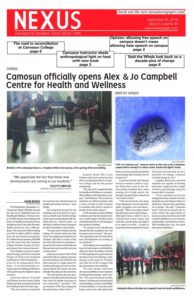I’m so tired of conservatives pretending that “free speech” on campus is an important issue. Student protests have been a staple of political movements since the inception of universities. Cast your gaze back in time and you’ll find countless examples of mass movements originating in academia. So with such a storied history of activism, why is our newest political hot topic such a benign, played-out debate?
For those who aren’t aware, the latest fuss to make the rounds across Canada is the issue of students protesting events organized for far-right speakers. Naturally, the right-wing factions of our society are quick to jump on this opportunity to wax poetic about the lofty virtues of free speech and how unfairly marginalized their viewpoints are in academia.
However, this debate merits a look into who these political speakers are and what messages they are disseminating. Two examples of figures under attack are Stefan Molyneux and Lauren Southern, both of whom were recently denied an audience on UBC’s campus due to student protest—much to the displeasure of free-speech-loving people everywhere.

Interestingly, though, it takes only a cursory glance at either figure’s Twitter account to find blatant white-supremacist talking points and examples of bigoted thinking. What these prominent figures are “debating” are not ideas, but the very nature of the personhood of other individuals—the validity of their ethnicity, their gender, their sexual orientation.
It’s not surprising, then, that they’ve framed this discussion around “free speech” rather than a more accurate term, “hate speech.” By defining the terms and boundaries of our debate, their side of the argument has placed itself in a favourable position before the discussion has even begun. How can one argue against the ideals associated with free speech itself?
You see, grammar can be propagandized with brutal effectiveness. One must dig deep and reveal what speech is being protected to uncover the real motivation behind this farcical “debate.”
Think to yourself—what reasonable, honest debate is there to be had about the superiority of one race over another, or on the validity of a group’s identity? This is not a debate at all—it’s an attack. These people aren’t defending free speech, they’re defending their ability to spread hateful, regressive rhetoric.
Reading articles about this topic from right-wing publications, you would think that this is a simple, cut-and-dried issue. After all, the Canadian Charter of Rights and Freedoms includes the universal freedom of expression! The failure of this reductionist argument is that the Charter itself specifically mentions that there are limits on what is acceptable speech—one such limit being hateful propaganda.
This is just another case of the right aping the very real grievances of marginalized people and using them for their own means. To be clear to conservatives out there—stop buying into your own sob story; you’re not an oppressed minority. Conservatism is learned socially. No one is born with a predisposition to the political right imprinted in their DNA.
It’s self-evident that there’s a more important debate to be had around this issue, but I fear we’ll never wash away the thickly painted, opaque layers that have been brushed over the topic to get down to them. In the meantime, we must continue to do all we can to fight the encroachment of hateful speech in our society and on our campuses.
